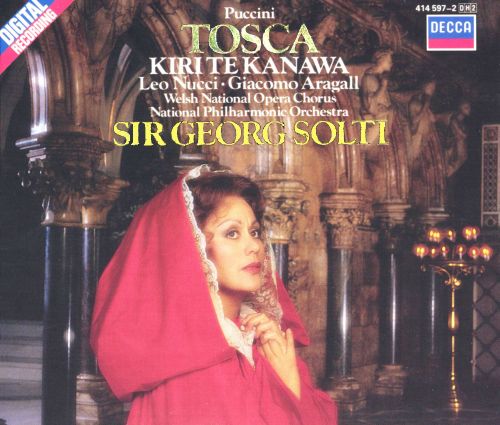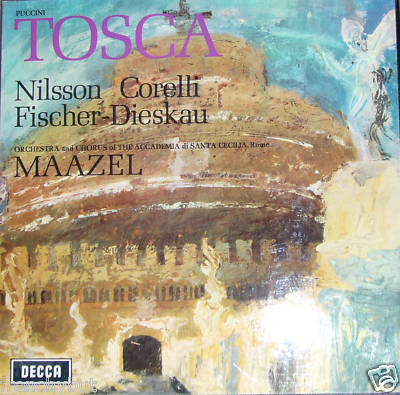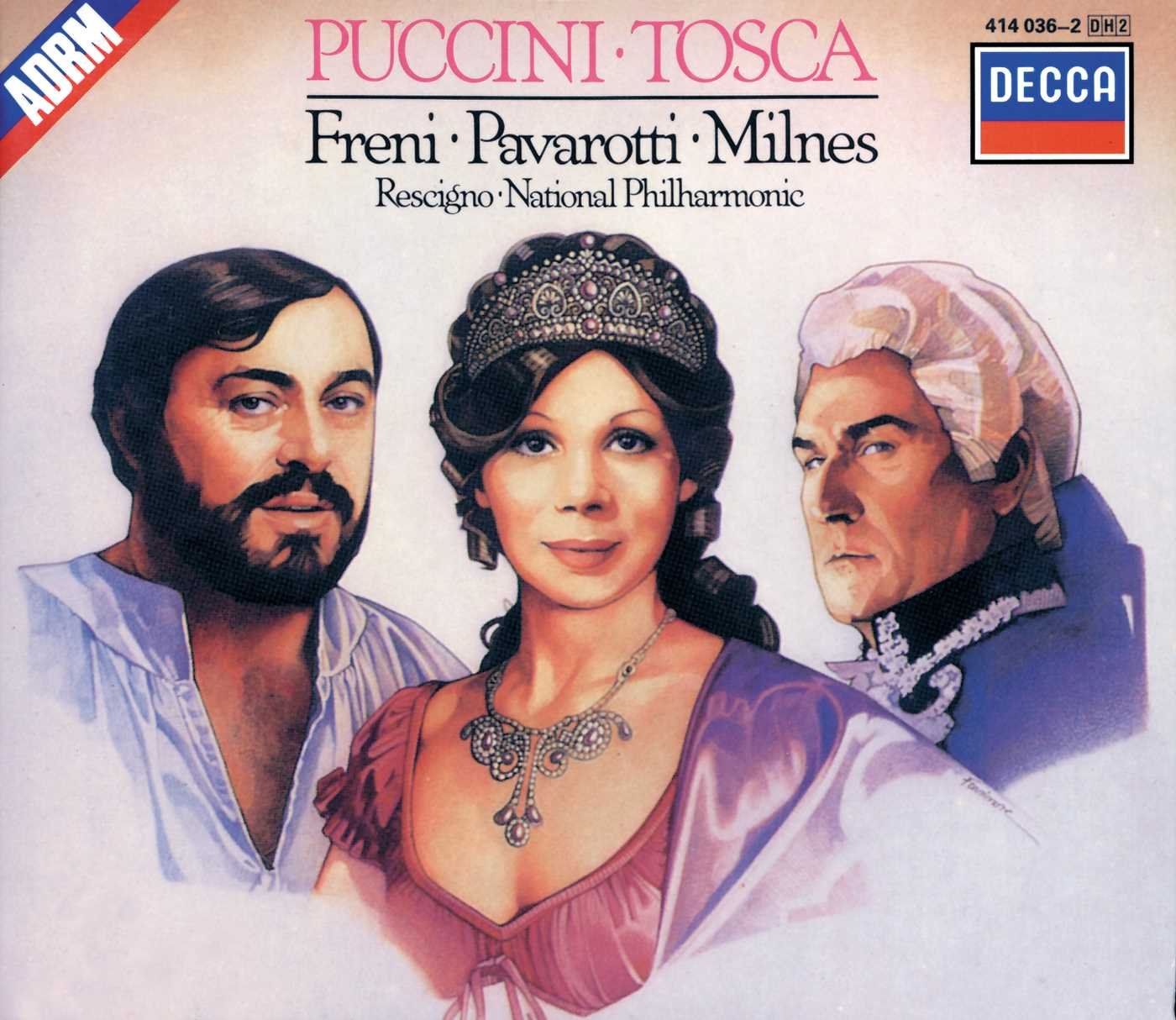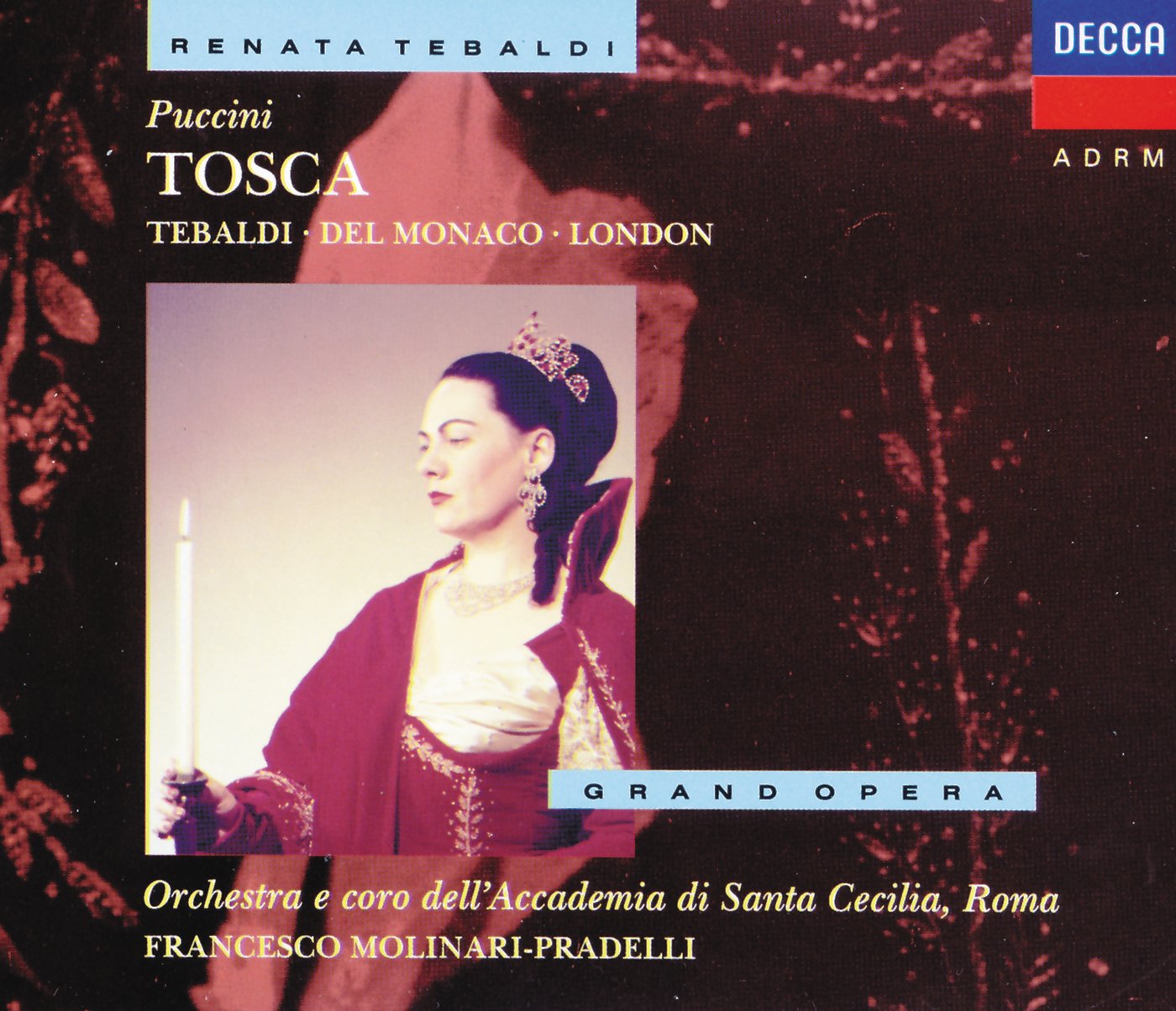For this comparison, I have chosen five different recordings of Tosca, all available from Decca Classics.

First off I revisited the 1984 Solti Tosca but have to say I got bored before the end of Act I and then just tried various bits in the other two acts. The sound is great. Apart from that the best thing in it is Aragall, though I wouldn’t prefer him to Di Stefano, Domingo, Carreras or Bergonzi, all of whom appear on other more recommendable recordings. Nucci is a dead loss and Te Kanawa out of her depth as Tosca. Solti’s conducting has little to commend it either, too slow in places and too fast in others. It just doesn’t add up to a convincing whole, and considering it was all recorded piecemeal, that’s hardly a surprise. I remember this set was originally issued in a blaze of publicity, but it didn’t sell well and was quickly remaindered. A totally forgettable performance.

Where I found the Solti a bit of a bore, this 1966 set is quite interesting, but often for all the wrong reasons. First of all Maazel’s conducting is fussy beyond belief. He can hardly let a phrase go by without pulling around the tempo or trying to bring out some detail in the score. There is no lyrical flow or sweep and ultimately Puccini gets lost on the altar of Maazel’s ego.
Fischer-Dieskau’s Scarpia is, as you would expect, intelligently thought out, but it never sounds idiomatic. He is an artist I admire in the right repertoire but Puccini was not for him. Corelli is, well, Corelli. He is definitely the best of the three principals, but he emphasises the heroic at the expense of the seductive. Nonetheless, as always, there is much to enjoy in the sound of the voice itself.
Then there is Nilsson. Well the top notes are fabulous of course, but this isn’t really a good role for her. She often overdoes the histrionics, as in her first scene with Scarpia where she adds a surfeit of sobs. She can also be a little clumsy in the ligher sections and Non la sospiri la nostra casetta is clumsy and unpolished. Ultimately, like Fischer-Dieskau, she sounds as if she had strayed into the wrong opera.
For all that I found this more enjoyable than the Solti, which is just plain dull. At least all the singers here have a personality.

So I’ve moved on to the 1978 Rescigno in this mini challenge and there’s little here to detain us. In fact I’d be tempted to place this below the Maazel, which at least has interest value. Rescigno was a favourite of Callas’s, recording many of her recital albums and delivering at least one great performance in the live 1958 Covent Garden Traviata but his conducting here is just plain dull. Like Te Kanawa, Freni is completely out of her depth, the voice just too light even at this stage of her career. I expected Milnes to be more interesting, especially when you think of his Jack Rance, but for some reason his Scarpia just isn’t nasty enough. Which leaves Pavarotti, who sounds out of sorts vocally. The velvet has gone from his voice and he often sounds plain whiney. Not surprisingly his Vittoria! is very small scale when set beside Corelli’s. And small scale is what personifies the whole performance, but that’s not what Tosca needs.

At last a real Tosca voice! Aside from at the very top of the voice when she can be a bit shrieky, Tebaldi fulfils almost all the demands the role asks of her. I say almost, because she doesn’t quite have Callas’s flexibility and lightness of touch in Non la sospiri la nostra casetta, but then few do. The beauty of the voice is well caught and she is a convincing Tosca. It’s not a particularly subtle performance, from any of the singers, but they do all have splendid voices of the requisite size and weight. Del Monaco is much better than I remembered, though he still bawls from time to time and his arias lack poetry. George London is the best of the Scarpias so far, his voice dark and threatening.
What lets this set down is the routine conducting of Molinari-Pradelli. He is a good accompanist, nothing more. Still, worth hearing for the three lead singers. The 1959 recording sounds good for its age.

So I’ve come to the end of my mini Decca Tosca challenge and what a difference the conductor makes. This 1962 recording is in an altogether different class from the others and the chief reason for that is Karajan’s elastic conducting, which is incredibly controlled without being rigid. Where Maazel’s conducting draws attention to itself because of the way he fusses with the rhythms, Karajan’s rubato is entirely natural. He has at his disposal a cast as well nigh perfect as any other assembled on disc. Taddei’s Scarpia is the best I’ve heard since Gobbi, sounding equally dangerous but in a completely different way. You feel this man could lash out viciously at any second. Gobbi’s Scarpia would be unlikely to get his own hands dirty, but you feel Taddei’s not ony would but would enjoy doing so. Di Stefano is in slightly fresher voice for De Sabata but he is still an excellent Cavaradossi, and I actually prefer him to both Corelli and Del Monaco. He fulfils all aspects of the character, artist, lover and revolutionary, finding the poetry in his arias and an almost crazed fervour in his cries of Vittoria. He brings more “face” to his character than anyone. Truly this was one of his very best roles.
Which leaves us with Price and here I have a feeling I might be treading on controversial ground. The voice is, of course, absolutely gorgeous, her characterisation sensuous and feminine, and her singing is deeply felt (Vissi d’arte is really lovely). She is a good deal preferable to Nilsson, Freni or Te Kanawa, but I would still place Callas and Tebaldi ahead of her in the Tosca canon. The Callas/De Sabata I know so well that it tends to play in my mind’s ear whenever I hear the opera, but I had also just listened to Tebaldi in the role and she sounds more like a natural for it to me. It’s hard to put my finger on what is missing, but I’d no doubt be perfectly happy with her Tosca if I hadn’t heard Callas and Tebaldi in the role. Nonethless she is one of the best Toscas on record and in very good company.
So now having heard all five of these Decca recordings, my final ordering would be
1. (by a fair margin) Karajan
2. Molinari-Pradelli (the only other really worth hearing, mostly for Tebaldi’s Tosca and London’s Scarpia)
3. Maazel
4. Rescigno
5. Solti
The De Sabata would still be my ultimate first choice, but the Karajan has also stood the test of time and anyone wanting an audio Tosca would be happy with either. If stereo sound is a must, then Karajan is the obvious first choice.
2 thoughts on “A clutch of Decca Toscas”